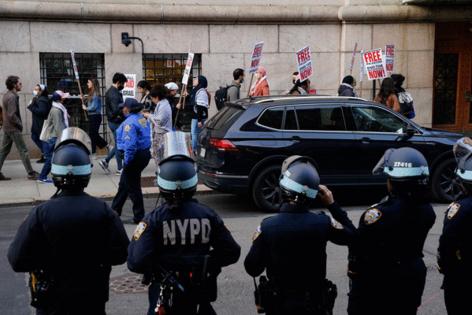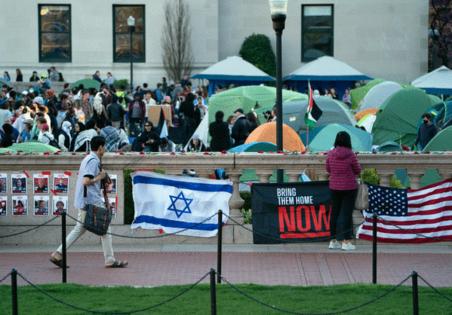Columbia University is being torn in 2 by anger, hurt amid Gaza protest encampments
Published in News & Features
NEW YORK — The tent demonstrations over the war in Gaza that have roiled Columbia University for the last two weeks have sparked anger and debate, and exploded into a national phenomenon.
But while the high-profile protests and calls for the resignation of the Columbia president seize public attention, a damaging and perhaps lasting change is underway on the Manhattan campus. Increased tension, growing alienation and vitriolic speech are cutting through the study body, creating wounds that may not heal.
“Since Oct. 7, it’s been very tense, but I never felt unsafe,” said Liam Schorr, a freshman from Long Island pursuing a dual degree at Columbia and the Jewish Theological Seminary.
“But ever since last week, it actually felt uncomfortable to be inside the campus.”
This semester, Schorr said he witnessed his roommate, who is Jewish, wear a shirt with an Israeli flag to a counterprotest and get slammed into a building, just outside the campus gates.
What is, in many ways, unique about the protests now underway at Columbia and other universities across the nation is that they have pitted the student body against itself. The protesters’ demonization of Zionism, for some young Jewish people, cuts to the core of their religious identity. There have been accusations and instances of both antisemitism and Islamophobia in and around the campus.
One of the leaders of the encampment, Khymani James, was recently banned after he said in a newly surfaced clip from a January Instagram Live, said that “Zionists don’t deserve to live” and “Be grateful that I’m not just going out and murdering Zionists.”
On the other side of the deepening divide, the intensity of the protesters, many of whom have cast this as a clear struggle between oppressor and oppressed, echoes the explosion of fervor in the Black Lives Matter movement after the death of George Floyd in 2020.
“What we’re facing here is anti-Palestinian hate that’s taking multiple forms, whether it is Islamophobia, racism, antisemitism,” said Mahmoud Khalil, a Palestinian graduate student, who is at Columbia on an F-1 visa and did not participate in the first encampment because of fear of deportation. “Columbia has not acknowledged this pain.”
For many, this isn’t just political. It’s personal.
...continued
©2024 New York Daily News. Visit nydailynews.com. Distributed by Tribune Content Agency, LLC.










Comments